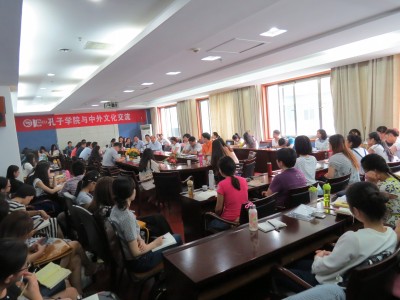This year marks the 10th Anniversary of the Foundation of the Confucius Institute. On Sept. 25th, an academic seminar was held at the School of Foreign Language and Literature, Wuhan University. Scholars and students from various schools were invited to gather and contemplate the history and the future of the Confucius Institute.
At the beginning of the seminar, Luo Anna, deputy director of Office of International Affairs, WHU offered an opening speech. She outlined the past developments and achievements of the 4 Confucius Institutes that WHU co-founded. She also emphasized the far-reaching significance of these projects and the cooperation with other countries in respect to mutually-beneficial cultural exchanges.
Subsequently, professor Guo Qiyong from the School of Chinese Classics, who was the keynote speaker for the seminar, stated his insightful views concerning the status quo and the possible transitions of Confucianism. As he pointed out, confronted with the challenges of ecologism, political liberalism as well as feminism and the like, Confucianism is still undoubtedly of vital importance within and even beyond Chinese culture. There is certainly huge room for communication and interaction between Confucianism and other contemporary social thoughts.
Also speaking at the seminar were several other scholars from School of Foreign Languages and Literature, School of Chinese Languages and Literature and they all shared their experiences in their administration and teaching at Confucius Institutes and put forward valuable suggestions specifically.
During the break time, the photo exhibition attracted the attention of many students. Among them, Wang Yue, who will be leaving soon for the Confucius Institute in Aberdeen in UK is one of the first group of volunteers who will be teaching there, was greatly inspired. “The work done by previous teachers and volunteers was just fantastic. I can’t wait to devote myself to this project of spreading Chinese culture.”
WHU is one of the earliest Chinese universities to participate in the foundation of the Confucius Institutes. So far it has co-established 4 Confucius Institutes with University of Paris VII, the University of Pittsburgh, the University of Duisburg-Essen and the University of Aberdeen respectively.

(Edited by Gerard & Sijia Hu)